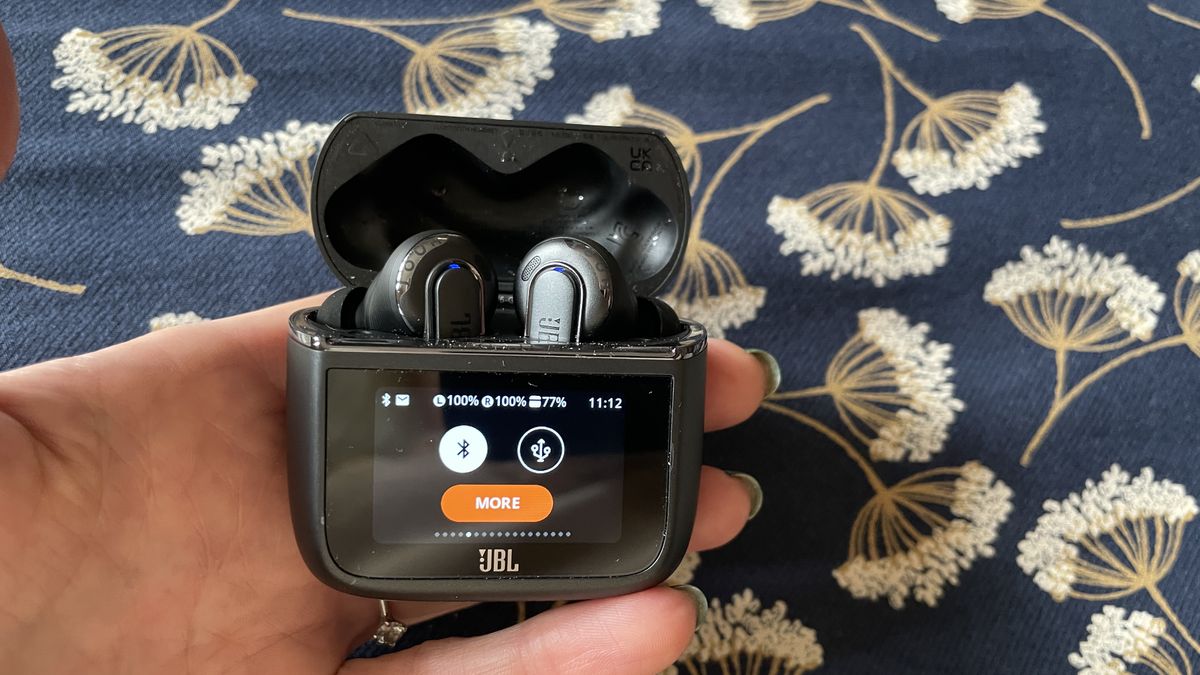JBL Tour Pro 3: Two-minute review
Sometimes, we can become victims of our own success. Are the new JBL Tour Pro 3 some of the best noise-cancelling earbuds I’ve ever tested? They’re emphatically the most feature-packed I’ve ever used, bar none, and that is wholly commendable. A quick scroll through the on-screen menu options is testament to that. These flagship earbuds do so much; to your music, to the voice of anyone you talk to during calls, to the ambient sounds around you, to your in-game experience, to broadcast audio to your friends – I could go on (I will go on, don’t worry).
So why do you sense a ‘but’ coming? Well, since the arrival of the January 2023-issue JBL Tour Pro 2 upon which this third-gen flagship set are built, JBL has offered much of its once-flagship tech to the cheaper Live 3 earbuds (which come in three flavors: ‘toothbrush-head’ Beam, ‘open-ear-ish’ Flex and ‘no-tail’ Buds propositions) including that super-impressive smart case. Which is good, right?
Yes, except it means that justifying the price hike from $199.95 / £179.99 for the excellent JBL Live Beam 3 up to $299.99 / £279.99 for the Tour Pro 3 isn’t easy. And making a case for buying the flagship set only becomes harder when you discover that the more budget set is now available for a bit less; a quick UK scan proved you can buy the Live Beam 3 for £149.99 – and I’d suggest that they’re amazing value for that money.
So what are the upgrades here? Let’s not mess around, I’ll tell you right now: you now get two color choices – black and a new ‘latte’ caramel-type finish – and the screen is 30% larger than the older Tour. Also the case a little smaller than that of the Tour Pro 2, but it’s still bigger than the Live Beam 3.
The headline-grabber is that this case is now a transmitter (see the Bowers & Wilkins Pi8, Jabra Elite 10 Gen 2 or LG Tone Free T90S for similar) meaning that with the included 3.5mm-to-USB-C cable, you can hook up to the in-flight movie system in your airplane seat (say) and broadcast the audio to your buds – but like B&W’s option, it’ll do it in high-quality audio, this time using LE Audio and the LC3 codec.
The JBL Tour Pro 3’s case is also one of the first registered Auracast source devices in portable audio, which means anyone in the vicinity with Auracast-enabled headphones (there aren’t too many about right now, but they’re coming) could also join to hear the sound being transmitted, and you can add a password if you don’t want random listeners hooking up to your broadcast.
JBL’s Spatial Audio 360 is onboard too, which now includes head-tracked, device-agnostic immersive audio helped by an updated algorithm; L/R balance optimization; 12 EQ bands to tailor things sonically and JBL’s new Personi-Fi 3.0 update. Personi-Fi helps to personalize the sound to your liking, creating a sound profile based on your hearing by giving you an otoacoustic test of sorts (more on this later).
Under the driver housing there’s now a hybrid 10.2mm cellulose dynamic driver coupled with a 5.1mm x 2.8mm balanced armature setup, which splits the audio signal so different frequencies go to their optimized drivers. Codec support is also better: in addition to SBC and AAC, hi-res LDAC joins the party when listening wirelessly – great news for Sony Xperia or other Android phone owners.
JBL also claims its new AI algorithm means the company’s True Adaptive Noise Cancellation 2.0 with ‘smart calibration’ is actually able to tackle what it calls ‘incident noises’ – think unusual, one-off sounds rather than constant jet engine cabin noise.
If that sounds like a lot for it to offer over the Live Beam 3, it is and it isn’t. The difference in screen size is negligible to the eye and for me the case is a touch on the bulky side to be truly pocketable. It’ll come down to whether you want that head-tracked spatial audio (which is very good indeed), the transmitter in the case, and/or an Auracast source device. If you’re not worried about those last two perks, I cannot build a compelling case for paying the significant price hike over the Live Beam 3.
Add to this the fact that for me, the Tour Pro 3 earbuds themselves are on the large side (despite the addition of foam tips as well as silicone, I struggled to get them to stay put in my ears) plus the fact that, like the cheaper set, you still need to make a compromise in terms of on-ear control options and you’ll see why I can’t give them the full five stars – or the 4.5-star verdict their cheaper siblings get – despite the plethora of perks.
JBL Tour Pro 3 review: Price & release date
- Unveiled on August 21, 2024
- Priced $299.95 / £279.99 / (approx.) AU$545
OK, so the JBL Tour Pro 3 are not cheap. What to say about the asking price? Well, the aforementioned flagship Bowers & Wilkins earbuds (which coincidentally launched on the same day and also offer a case transmission feature – but no spatial audio processing) are even more expensive, at $399 / £349 / AU$699.
Elsewhere, Bose’s QuietComfort Ultra Earbuds also come in at $299 / £299 / AU$449; Technics’ excellent EAH-AZ80 are $299 / £259 / AU$499 as well, and the Final ZE8000 MK2 are $399 / £289 (around AU$609), where available.
It’s worth noting that the older Tour Pro 2 launched in January 2023 at MSRPs of $249.95 / £220 / AU$350, so there’s been a $50 / £50 price hike this time around. Given the upgraded specs listed, you could say that the new asking fee doesn’t seem unreasonable. On the other hand, I really think the small matter of the splendid $199.95 / £179.99 / AU$249 JBL Live Beam 3 remains a thorn in this Pro set’s side…
JBL Tour Pro 3 review: Specs
| Drivers | 10.2mm cellulose dynamic; 5.1mm x 2.8mm BA |
| Active noise cancellation | Yes (adaptive and selectable) |
| Battery life | 11hrs (buds) or 44hr total with ANC off; 8hrs or 32hr total with ANC on |
| Weight | 5.6g per earbud |
| Connectivity | Bluetooth 5.3 with LDAC plus LE Audio and LC3 in dongle mode (USB-C/wireless charging) |
| Waterproofing | IP55 |
| Other features | Case retransmission feature in LC3 codec quality, Auracast source device; smart case; 6 mics; head-tracked spatial audio |
JBL Tour Pro 3 review: Features
- Excellent spatial audio with head-tracking
- Case retransmission feature adds value
- Noise cancellation is good rather than excellent
Before I launch headfirst into what the Tour Pro 3 do incredibly well, if you want Bose QuietComfort Ultra Earbuds or AirPods Pro 2 levels of active noise cancellation, you don’t quite get it from JBL Tour Pro 3. When I deploy ANC (and here you can select from a seven-step slider or pick ‘Adaptive ANC’ to have JBL’s algorithm sort it) I do feel the noise floor drop, but that cocooned, bubble-of-silence feeling is never quite achieved.
This may be in part to the fit and seal I was personally able to get – despite the in-app ‘Check my best fit’ test telling me I’d got it just fine and toggling ‘Auto compensation’ on, in the ANC customization tab (which promises to check wearing and ear canal status to adjust ANC in real time) the Tour Pro 3 never felt incredibly secure in my ears, and this does contribute to sound leakage and passive isolation.
However fervent the claims JBL makes about its souped-up True Adaptive Noise Cancellation 2.0 with ‘smart calibration’ (the company says it does a good job of nixing ‘incident noises’ as well as regular low-level constants), I never quite feel it. Don’t get me wrong: there is a marked difference to the level of extraneous noise that seeps in, but it isn’t wholly cancelled, and the Tour Pro 3 never perform as well as the options listed above in this area.
Now, the really very good bits: spatial audio. Oh, it’s good. When I cue up Rod Stewart’s Handbags & Gladrags, the drums sit over on my right as flutes join in, somewhere behind my brainstem. Honestly, as I deploy head-tracking and turn my head slowly away from my phone, I notice when Stewart belts a little too close into the mic, or a key is miss-played in a chord – or that there’s actually a conversation barely audible, during the last chorus. You don’t get this head-tracked spatial audio support with the cheaper Live Beam 3. Is it worth the $100 / £100 price hike? If they only fit a little better for me, probably… but I’m getting ahead of myself (the sound and design sections come later).
Now the screen: it’s just as snappy as the one you’ll find on the JBL Live Beam 3 and although marginally bigger, it doesn’t do an awful lot more. Functional screens (ear tip sound settings; toggling between Bluetooth and transmitter mode; options within spatial sound) are here, but the chief benefit here is still the lock-screen wallpaper.
Elsewhere, JBL really has thrown everything and the kitchen sink at these earbuds. Top of the pile is Personi-Fi 3.0, but here again I find myself backtracking to the Live Beam 3 and trying to justify whether they’re worth a price hike. I absolutely loved Personi-Fi 2.0, in the Live Beam 3, and I’m not 100% sure how this has been upgraded – because I once again took the test (which involves listening to various tones and lifting your finger from a button when you can no longer hear them) to create a test report and your own personal augmented profile, and once again I got the self-same result. I still love the effect of it in the Tour Pro 3, but I can get it for cheaper in the Live Beam 3…
Call-handling is again very good, thanks (again) to the numerous options you have available to enhance the experience, including Sound Level Optimiser, which balances the volume of the voice on the other end of the line; Sound Setting, to increase the bass or treble of the voice at the other end of the phone, or keep things “natural”; Voice Setting, aka same thing but for your own dulcet tones in the call; VoiceAware, which is a slider to control how much of your own voice you’d like to hear during calls; and Private Call Mode, which actually lets you remove one bud and use it as a mic – ie. to talk a little quieter and keep the conversation on the down-low. Again, it’s all very good, but you can get it in the Live Beam 3 too, for less.
You get the same six EQ presets as the Live Beam 3 too, or the ability to create your own, plus Adaptive EQ for automatic adjustments in real-time with the option of toggling on “Low Volume EQ” to boost highs and lows if listening at low volumes, plus “Leakage Compensation”, to help the sonics if the tips you’ve fitted don’t offer a perfect seal.
And of course, here you also get a transmitter mode. Do you take a lot of flights? You’ll love it and so will the person sitting next to you, who won’t entangle themselves in any headphone cables when trying to politely nip past you and your tray table. Also, the Tour Pro 3’s case is an Auracast source device, if you’ve got friends with (new, Bluetooth 5.2 and later) earbuds that can join the party. Will I personally use these features often? No. But they are extra perks in a set of earbuds that already offered myriad features.
The JBL Tour Pro 3 offer an admirable battery life of up to 44 hours in total – 11 hours from the buds plus three more full charges with ANC off. If you’re always using ANC, it’s eight hours plus three more full charges with ANC on, for a 32-hour total. During my testing I got just over eight hours and 20 minutes from them on a single charge with ANC deployed, which is very impressive. And that claim of an additional three hours of listening with a quick 10-minute speed charge? Yup, all good – and very useful.
JBL Tour Pro 3 review: Sound quality
- Admirable separation and detail in head-tracked audio
- A zealous mix; brims with energy
- Plays nice and loud at 50% volume
I knocked the JBL Tour Pro 2’s sound quality and the good news is, it’s a different story with the Tour Pro 3. Your codec support here includes LDAC if you own an Android device to deploy it, which won’t do much for your lowly Spotify streams but will help you get the best from Tidal Max tracks, Apple Music playlists or Qobuz albums.
The rumble at the outset of Grian Chatten’s The Score is deftly handled and gives way to the detailed and textured Spanish guitar. The album continues to Last Time Every Time Forever and something I haven’t felt since testing the Bose QuietComfort Ultra happens: I forget I’m wearing earbuds for a second because the head-tracked spatial audio sounds so convincingly like it’s coming from below my chin. Sadly, this only lasts until I turn my head sharply (as that dislodges the right earpiece) but you can’t knock the talent of the driver array here.
Switching to Free Fallin’ by Tom Petty, jangly guitars, a resolute easy drum and Petty’s vocal are present with ample room to shine, in a cohesive mix that never sees one instrument or musical passage vying for enough space to be impactful. When backing vocals come in to echo the words “Ventura Boulevard”, there’s a level of detail to the dynamics to the mix similar to the kind you get with the Bowers & Wilkins Pi8.
Also, the Tour Pro 3 play nice and loud, even at 50% volume, which means those battery claims are bang on. (Often find yourself whacking the volume up to get robust audio from your earbuds? Impacts the stamina doesn’t it? Not a problem here.)
In direct comparison, the zealous and energetic presentation of the Tour Pro 3 may have one very small shortfall, and it’s to do with the timing. It’s not a cluttered or disorganised performance by any means, you understand, but I tap my feet more readily during what I call the ‘marching band’ section of this track (where Phil Jones switches up the time signature on his drums) when listening to the Bowers & Wilkins earbuds.
Again, it’s only a very minor issue and only notable in direct comparison, but the JBL earbuds lose out just fractionally for regimented accuracy across the frequencies here – as if the two drivers under the hood haven’t quite married up perfectly. It’s a difficult concept to explain without going overboard, so know that it isn’t a big issue at all. If pushed to expand on it, it’s as if the B&W product keeps a wholly tight grip on every musical strand, constantly, and the JBL earbuds just very occasionally loosen one, through the treble.
- Sound quality score: 4.5/5
JBL Tour Pro 3 review: Design
- Driver housings feel a little thick
- On-ear functions still require a compromise
- Not-so pocketable case
One thing I really like about the JBL Tour Pro 3 is the rubberized section on the back of the case that offers traction when placed on most surfaces. If, like me, you tend to gesture a lot when you talk (or love a good dance al desko) often swiping your earbuds case to the floor with a flourish, this won’t happen here.
The JBL Tour Pro 3’s case opens like a satchel (think AirPods) rather than a suitcase (think JBL Live Beam 3) and while it feels well-made, the case is a little too bulky to slip into my pocket anonymously. Also, there isn’t a lanyard hole here, as there is with the Live Beam 3, which was a fun way to showcase your lock-screen wallpaper.
My issue with the JBL Tour Pro 3’s design and where they lose marks in this section is the size of the driver housings. Now, I know I’ve said before that actually, deeper ‘concha-fit’ designs – see the Technics EAH-AZ80 – often look a little big and end up feeling anything but. Sadly, that’s not the case with the Tour Pro 3. Despite supplying foam tips as well as silicone, the addition of a stem and a deeper housing makes for a poor fit, for me. I still struggle to keep them in my ears.
Now, fit is obviously subjective, but I know (after compiling a list of the best earbuds for smaller ears) I’m not alone in finding certain options easier to accommodate in my bijou ears than others. This set of earbuds will not be making an appearance in the above buying guide.
I do have one more minor negative though, and it’s the self-same minor issue I encountered with the JBL Live Beam 3. Basically, you need to ditch a set of functions again. To explain, you can customize what tapping each bud controls, but the sums don’t work. Your command options are Playback Control, Ambient Sound Control, and Volume Control – ie. three-fold. But humans typically have only two ears and thus only two earbuds to give jobs to, so one useful thing is left out of the mix.
It could be worse; earbuds that don’t offer a way to tweak the volume of music without having to dig out my phone (or ask Siri) annoy me most, but while the JBL Tour Pro do offer volume control, assigning that to my left earbud and Playback Control to my right means foregoing on-ear ANC > Ambient aware > Off tweaks. The touchscreen gives you another way to quickly access the ANC, Ambient or TalkThru modes besides my phone, it’s true, but at this level I think it’s not unreasonable to expect a comprehensive set of on-ear controls that covers the lot simultaneously – because other options, such as the Cambridge Audio Melomania M100, do.
JBL Tour Pro 3 review: Value
- The most fully-featured earbuds around
- …but sadly, the JBL Live Beam 3 exist
- Can’t offer the full suite of on-ear controls at once
As I’ve tried at length to explain in this review, the JBL Tour Pro 3 are a very interesting proposition and to justify their price hike over JBL’s talented Live Beam 3, you do get head-tracked spatial audio, Auracast broadcasting, a slightly bigger screen, a case retransmission feature for in-flight entertainment systems, plus additional foam eartips and processing that claims to compensate for the tips you’ve chosen.
On paper and in the flesh, they’re stuffed to the gills with features. The problem is the existence of the excellent, cheaper, also screen-enhanced earbuds the company released in January 2024, instantly making those once-flagship perks afforded by a smart screen available for much less.
Are the extras listed above enough to represent great value? I think for most people, no. Yes, the Denon PerL Pro-esque Person-Fi hearing tests are excellent, but for me, they’re no different to those you’ll get within the much cheaper JBL Live Beam 3. Both are very good indeed, and one can be had for significantly less money (aka, better value). And the thing is, the cheaper set fit my ears much better than the flagship Tour Pro 3’s bulkier driver-housing…
Should I buy the JBL Tour Pro 3?
| Section | Notes | Score |
|---|---|---|
| Features | The case retransmission feature, Auracast support and head-tracked spatial audio are winning perks. | 5/5 |
| Sound quality | Very good sound, only (just) beaten for timing by a class-leader. | 4.5/5 |
| Design | A bulky earbud that won’t fit smaller ears. | 3.5/5 |
| Value | Unless you love head-tracked spatial audio, the smart money’s in the Live Beam 3. | 3.5/5 |
Buy them if…
Don’t buy them if…
JBL Tour Pro 3: Also consider
| JBL Tour Pro 3 | Bowers & Wilkins Pi8 | JBL Live Beam 3 | Cambridge Audio Melomania M100 | Bose QuietComfort Ultra Earbuds | |
| Price | $279 / £279 / AU$545 | $399 / £349 / AU$599 | $199.95 / £179.99 / AU$249 | $219 / £169 / AU$299 | $299 / £299 / AU$449 |
| Drivers | 10.2mm cellulose dynamic; 5.1mm x 2.8mm BA | 12mm carbon cone | 10mm dynamic | 10mm driver, recycled Neodymium magnets | 10mm |
| Active noise cancellation | Yes | Yes | Yes | Yes | Yes |
| Quoted battery life | 11 hours (buds) 44 hours (case) with ANC off; 8 hours (buds) 32 hours (case) with ANC on | 6.5 hours (buds); 20 hours (case) | Up to 12 hours (buds), up to 48hours total | 10 hours (buds) 33 hours total (with case) with ANC on | 6 hours (buds) 24 hours total (with case) |
| Weight | 5.6g per earbud | 7g per earbud | 5g per earbud | 6.65g per earbud | 6.24g per earbud |
| Connectivity | Bluetooth 5.3 with LDAC plus LE Audio and LC3 in dongle mode (USB-C/wireless charging) | Bluetooth 5.4 with aptX, aptX Adaptive, aptX Lossless; USB-C with two cables in the box for case retransmission | Bluetooth 5.3 with LDAC, USB-C, | Bluetooth 5.3, aptX Lossless, aptX Adaptive, AAC, SBC (USB-C and wireless charging) | Bluetooth 5.3, USB-C, aptX Adaptive, Snapdragon Sound |
| Frequency range | 20 Hz – 40 kHz; | Not stated | 20Hz – 40kHz | Not stated | Not stated |
| Waterproofing | Yes, IP55 | Yes, IP54 | Yes, IP55 | Yes, IPX4 | Yes, IPX4 |
| Other features | Case retransmission feature in LC3 codec quality, Auracast source device; smart case; 6 mics; head-tracked spatial audio | Multipoint to two devices; Case retransmission feature in aptX Adaptive quality | Fit test, six-mics per bud, smart screen case, three spatial audio profiles | Triple core processor architecture; class A/B amplification; three mics per earbud with noise suppression for calls | High performance audio mode |
How I tested the JBL Tour Pro 3
- Tested for three weeks; listened against the competition
- Used at work and home
- Listened to Tidal Masters, Apple Music Lossless tracks and Spotify
The JBL Tour Pro 3 became my musical companions for nearly four weeks – after a thorough 48-hour run-in period, as per our guidelines on how we test wireless earbuds.
I wore them to work on weekdays (running to the station; on the London Underground; at the office), and during a weekend on Weymouth sea-front – the best way to test blustery wind interference from mics during calls I’ve ever found.
To better test the comfort and security of the Tour Pro 3, I even wore them during a cycle along the promenade, and while they did ping out onto the street, they seem virtually uncrushable (since I believe another bicycle may have gone over it).
To check the audio quality across the frequencies, I listened to TR’s playlist (spanning everything from acoustic mixes to electronica) on Apple Music, Qobuz and Tidal, but I also tested using podcasts and albums on Spotify, plus YouTube tutorials (mostly about how to duck-dive while surfing because I still can’t do it, in case you wondered) on my MacBook Pro. I compared them directly against the Bowers & Wilkins Pi8, Cambridge Audio Melomania M100, AirPods Pro 2 and JBL Live Beam 3.
I’ve been testing audio products well for over five years now. As a dancer, aerialist and musical theater performer in a previous life, sound quality, fit and user experience always take priority for me – but having heard how effective ANC can be when done well, I have grown to love immersing myself in a cocoon of silence also.
Read TechRadar’s reviews guarantee
- First reviewed: October 2024
Read the full article here














